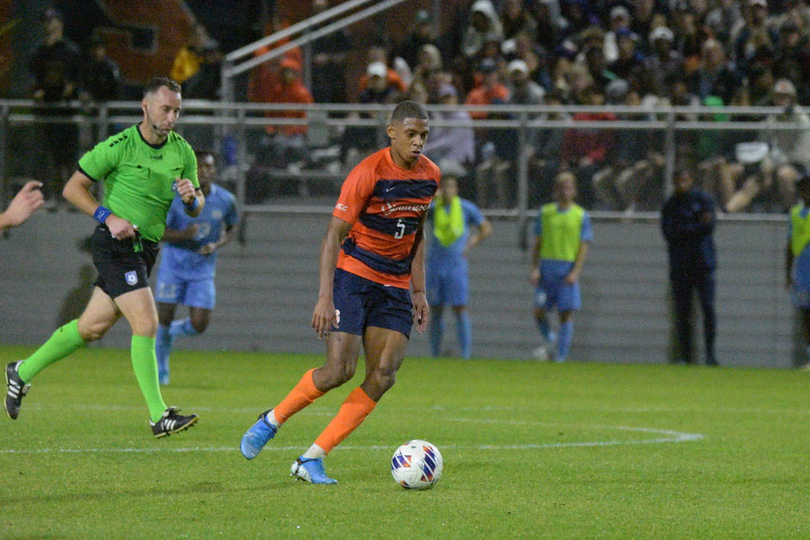Amferny Sinclair’s academic focus led him to Syracuse

Jacob Halsema | Staff Photographer
After a brief struggle with balancing soccer and his studies, Amferny Sinclair has shone at Syracuse as a student-athlete.
To support student journalism and the content you love, become a member of The Daily Orange today.
Amferny Sinclair often told his mom he thought he was born in the wrong generation. His favorite program was the History channel. He tore through books. He loved math.
“He liked to practice math a lot,” his mother Yorleny Sinclair Clark said, “He’s different.”
In high school, Sinclair was invited to a party with some of his soccer teammates and decided to go. He only made it an hour before calling his mother to pick him up. After all, he had practice in the morning.
“He told me, ‘Mom, I don’t really have time for those things, I don’t enjoy those things,’” Yorleny said. “He was so angry to see his teammates drinking alcohol because they had a game.”
Now Syracuse’s senior captain and head coach Ian McIntyre’s “first name on the team sheet,” Sinclair has led Syracuse to an Atlantic Coast Conference Championship and its highest-ever seed in the NCAA Tournament. As the only SU player from Central or South America, Sinclair’s path from Costa Rica to Syracuse was unorthodox, but reflected his family’s emphasis on education, spearheaded by Yorleny, an English teacher.
Yorleny said Sinclair wants to go pro, but if he doesn’t get enough MLS SuperDraft interest, he’ll stay for a fifth year and he’s interested in the data analytics graduate school program once he completes his economics degree.
“[My sons] can practice any sport,” Yorleny said. “We always were there, my husband and I, but they really need to study because it’s going to help you be a better person, you can communicate better.”
He showed academic prowess early on and was a great student from a young age, Yorleny said. But the classroom wasn’t the only thing he had a passion for.
Sinclair’s first words were, in order: “gol, gola, mom.” At seven years old, a physical education teacher at his primary school noticed his soccer skills and recommended to his father that Sinclair try out for Liga Deportiva Alajuelense, his hometown club and a top team in the country. Sinclair made the youth team and practiced every day for 2-3 hours.
His love for the game was perhaps most exemplified by his family’s home decor, or lack thereof. When someone visited the Sinclairs’ house, they couldn’t break anything because everything had already been broken, Yorleny said.
“I have a wood vase because they practiced indoor and outdoor soccer,” Yorleny said.
Every 15 days, the Sinclair family went to the supermarket, where Sinclair would always persuade his parents to get him a new ball. Yorleny joked that she couldn’t even walk around the house because of how many balls there were.
Sinclair played at Alajuelense for 11 years, climbing from the youth ranks to the second and reserve teams. He also began to receive appearances in the starting lineup. After graduating high school, he enrolled in pre-classes at college, something none of his teammates did. But between classes and two practices a day, he couldn’t keep up.

Emma Kelly | Design Editor
Sinclair’s play was suffering because of his studies, and his time commitment with Alajuelense also hurt his academic performance. He tried to break into the first team, but the practice schedule made it “impossible to actually attend classes,” Sinclair said.
The breaking point for Sinclair happened when he got invited to play a friendly match with the first team, admittedly a “really big opportunity,” Sinclair said. But he had an exam. Studying forced him to miss practices and his coaches didn’t understand why he was going to classes in addition to playing soccer.
“They saw me as a prospect for the team,” Sinclair said. “Of course I didn’t want to leave — this is a club that I supported since I was a child — but I really was interested in academics and being able to balance more things.”
Sinclair’s spell playing for Alajuelense and taking classes was over in six months. Now focused on gaining a college scholarship to play in the United States, he treated the rest of the year as a gap year and studied for his SAT and other exams.
He enlisted a recruiting service, Propela, to connect him with college coaches. Syracuse reached out and McIntyre watched Sinclair play for Costa Rica in the U20 World Cup qualifiers in Florida. Longtime assistant Jukka Masalin flew to Costa Rica to finalize the offer with Sinclair and his parents.
But relocating to a new place 4,000 miles away was never going to be easy. Sinclair didn’t get a chance to visit Syracuse because of his schedule with the Costa Rica youth national teams. Yorleny noted that Manel Busquets, who left the Orange to play in Spain last year, helped Sinclair adjust to college life in the United States.
Sinclair spoke English, but needed to adjust to all his classes being taught in it. To get better command of the language, he watched more English television shows, listened to music and spoke the language with his teammates. Now, he leads the team in GPA. Last semester, after earning high marks in an economics class, he called his mom.
“It really is possible to play soccer and study at the same time,” Sinclair told her.





